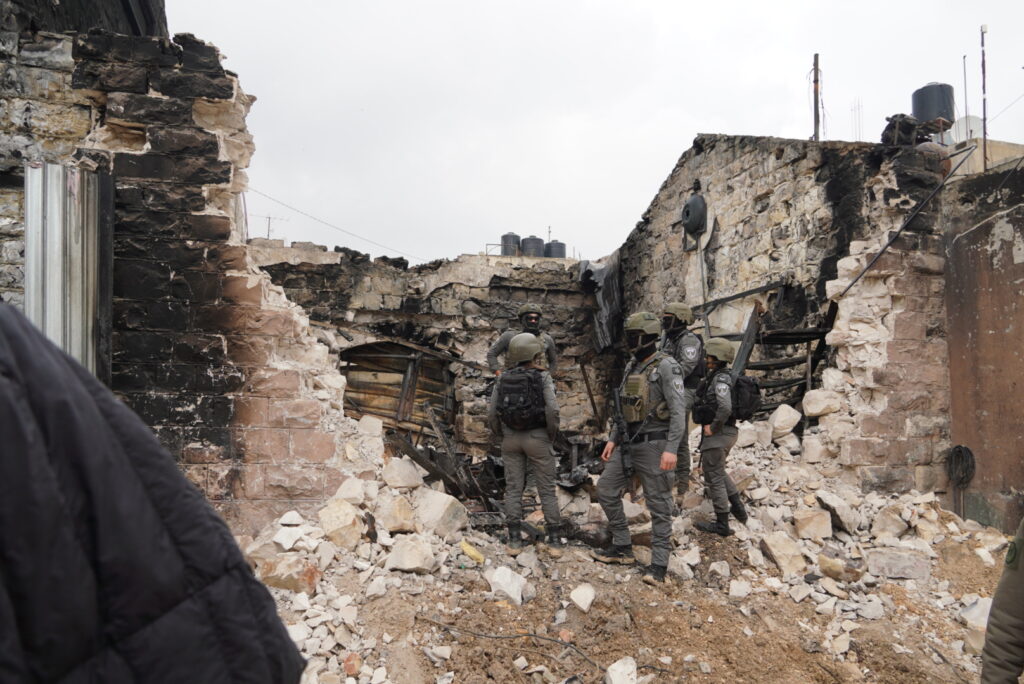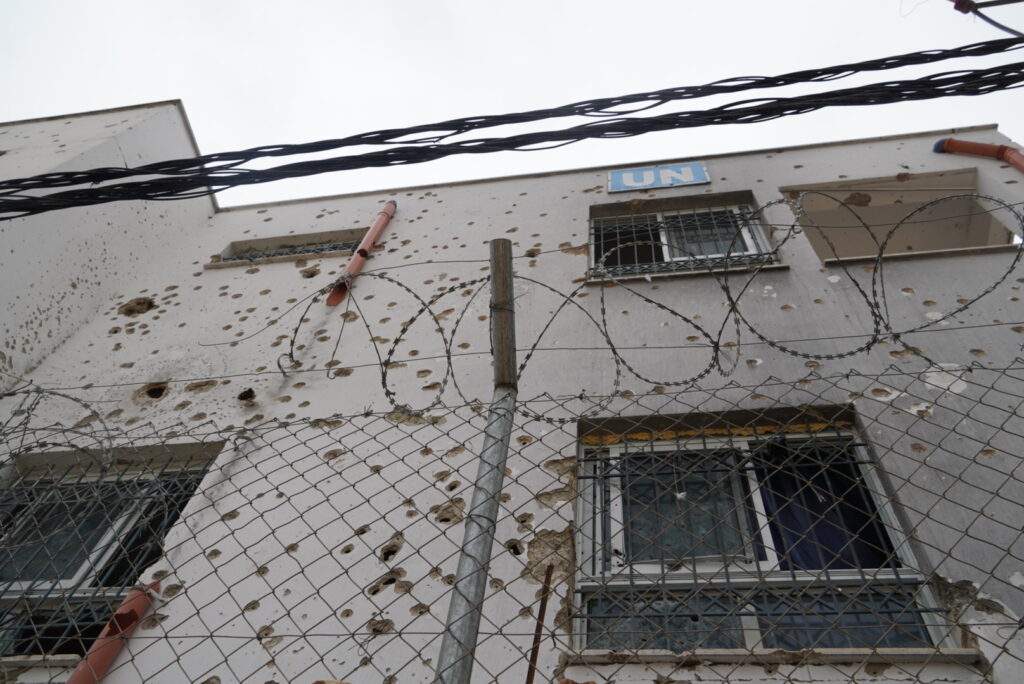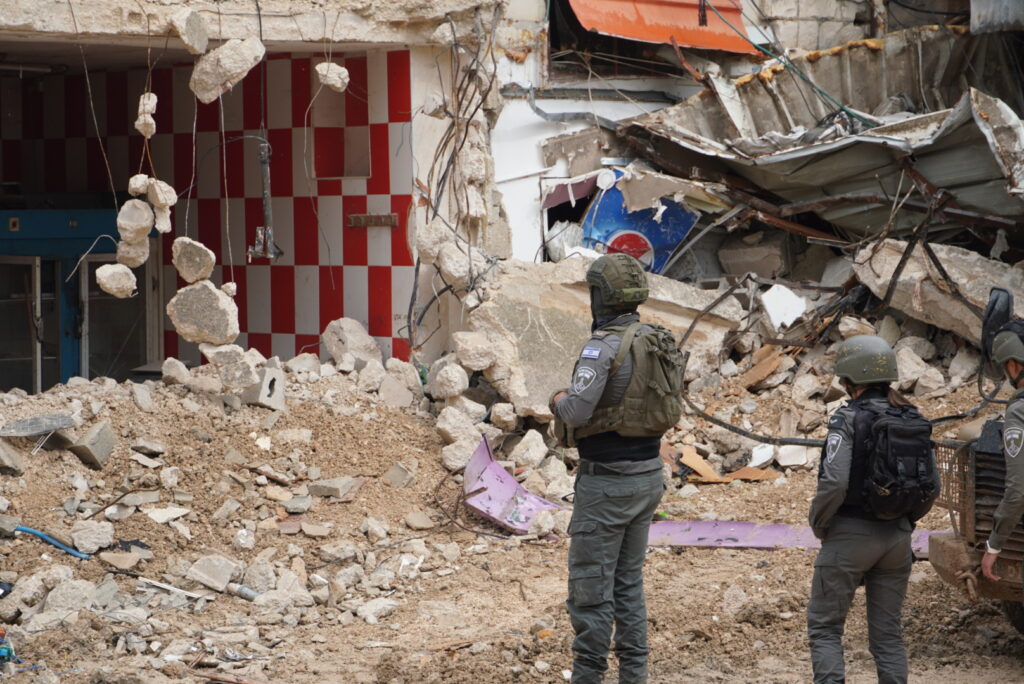Inside Jenin: An Eyewitness Look at How Palestinian Terror Groups Turn Schools and Mosques Into Battlegrounds
‘They are cowards. They hide behind women giving birth instead of meeting us face to face,’ an Israeli officer says.

JENIN, West Bank — “Some of the explosive devices the terror groups use can destroy the armored vehicle we are in.”
The heavily armed and masked officer from the Israeli Defense Forces’s Judea and Samaria Division is escorting a handful of journalists at Jenin into a large refugee camp adjacent to the city in the northern West Bank where the IDF launched another major counter-terror operation three weeks ago.
The windows in the armored vehicle are barred and just big enough to catch a glimpse of what’s going on outside. But the constant bumps and the dirt on the windows give me an idea of what to expect when we finally reach our first stop.
I step out into what used to be a road but is now nothing but thick mud. The rain falling down is only making everything messier and nearly impossible to walk in.

Three weeks ago, the Israeli army launched “Operation Iron Wall” to once again crack down on what’s known as the Jenin Brigade, which is made up of members from Hamas, Islamic Jihad and the Al Aqsa Brigade, all of which are designated terror groups.
But while Israel has launched countless operations in Jenin in the past, this one is much more aggressive and broader in scope. Almost all the homes I see have bullet holes in them, the roads have been destroyed by the IDF in an attempt to clear it from the improvised explosive devices planted by the terror groups.
The IED’s pose a great challenge to the Israeli military. Since Oct. 7, 2023, when the IDF started operating heavily across the West Bank again, seven Israeli soldiers have been killed by IED’s.
Only 1,000 of the nearly 18,000 residents of the camp have left their homes in the past three weeks, the officer estimates when asked how many are left.
And, as usual, the narrative of the situation widely differs when you ask the Israelis and Palestinians about the situation in Jenin.
The Palestinian Foreign Ministry has accused Israel of carrying out “ethnic cleansing” and “enforcing forced deportation and displacement” of the camp.
But for Israel, getting civilians out of harm’s way is crucial, as the terror groups are deeply embedded in the civilian infrastructure, from hospitals to schools to mosques.
The latter two we get to see for ourselves. The second stop in the camp is at a now empty UN-run school. The front of the building is full of bullet holes, revealing the intensity of the fighting between the IDF and the Jenin Brigade.
“Every time our forces entered what used to be this road, they would start shooting at us from the windows of the schools. And as you can see, they put up a camera in the upper right corner of this window so that they knew when we were coming,” said the officer, who asked to remain anonymous for security reasons.
In front of the school are remnants of a building which was destroyed by one of the IED’s detonated by the Jenin Brigade when soldiers entered the area.

While the Palestinian Authority (PA) is technically in charge of Jenin’s security as well as civil affairs, the terror groups have largely taken over control with the city.
This led to the PA launching a rare counter-terror operation in Jenin in early December, which saw about a dozen people killed, including civilians, a journalist, members of terror groups and PA forces.
The terror groups’ use of civilian infrastructure has gotten so blatant that both the PA and UNRWA – the UN’s agency for Palestinian refugees – have both echoed Israel’s condemnation of their use of hospitals for military purposes.
According to the Israeli officer, several members of the Jenin Brigade are currently hiding inside one of the hospitals in the camp.
“They are cowards,” the officer said. “They hide behind women giving birth instead of meeting us face to face. We won’t go in there, but we will get them when they come out.”
Not far from the UN school lies the Jabriyat Mosque, which overlooks Jenin as well as Israeli forces. What used to be a holy place has been turned into a hotbed for terrorists.
Before we enter the mosque to see evidence of the heavy fighting between the IDF and the Jenin Brigade, loud gunfire fills the air.

“It’s our forces you hear. They are fighting the terror groups not far from us,” the officer says.
The officer tells us that about 30 feet from where we stand, a young female Israeli soldier was killed by an IED.
Inside the large mosque, I see bullet holes are everywhere on the walls and bullet shells lie spread across the floor.
The buildings in front of the mosque are also riddled with bullet holes from the Jenin Brigades’ fighting with Israeli soldiers.
“This mosque is strategically important for the terror groups. You can see the whole camp from here, including our forces. And you can even see the outskirts of Afula in Israel,” the officer explains.
On the lower floor of the mosque is more evidence of the heavy fighting that occurred here. “This was actually a shooting range for the terrorists,” the officer says.
The windows downstairs are full of sandbags used as fortifications, providing more evidence for how the Jenin Brigade had turned the mosque into a military base.
According to Israeli estimates, over 35 terrorists have been killed in “Operation Iron Wall” the past three weeks, and some 150 members of the Jenin Brigade are still active.
But as often happens, civilians are getting caught in the crossfire. Just two weeks ago, the Palestinian Health Ministry said a 2-year-old girl named Layla al-Khatib was shot in the head by the IDF.
The IDF has since launched an investigation into the incident which took place in the village of ash-Shuhada outside Jenin, where the Israeli military was trying to flush out gunmen.
For Israel, Jenin poses a significant threat due to the many attacks planned and carried out in Israel and against Israelis in the West Bank by members of terror groups in the city.
The officer says that the next October 7 is likely being planned in Jenin and other hotbeds for terror groups in the West Bank such as Tulkarm and Nur Shams, where the IDF is also operating.
When asked how long the IDF will continue the operation, the officer says: “Until the job is done.”

